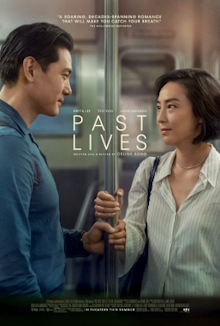Cinephiles sometimes say that they don’t make love stories any more and that’s somewhat true. The issue is that no one really believes in the idealistic romances of the past and so many of the classic romantic films are now judged to be problematic. So along comes this Korean-American film which on the face of it seems to be about two star-crossed lovers who are destined to be together since they were children. Thankfully, this film is wiser and more mature than that as it recognizes how the decisions that we make in our lives change who we are. I dislike how it makes the world feel so small with its laser focus on the two main characters but I have to admit that it’s a great update on the traditional love story that fits with our times.
Na Young and Hae Sung are classmates and childhood sweethearts in elementary school in Seoul. Just before Na Young’s family emigrates to Canada, her mother arranges for her to have a play date with Hae Sung so that she will have happy memories of her time in South Korea. Twelve years later, Hae Sung thinks of her again when he does his mandatory military service. By this time, Na Young has changed her name to Nora Moon and has moved to New York. They reconnect through Facebook and enthusiastically spend hours chatting with each other through video calls. Yet both have lives of their own to lead and are unable to visit each other. Finally Nora decides to stop their calls in order to fully commit to her life in the US. Hae Sung goes to China to learn Mandarin and meets a girl there who becomes his girlfriend. Nora attends an artists’ retreat in Montauk where she meets with fellow writer Arthur Zaturansky. Another twelve years pass before Nora and Hae Sung get in touch with each other again. He arrives in New York for a holiday and by this time Nora is already married with Arthur.
The film plays with the concepts of fate and past lives, as the character banter about how two people who happen to meet must be somehow connected in a prior incarnation. I can understand the appeal of framing a grand romance in this manner but it’s not meaningful to me and indeed it’s superfluous in the context of the story here. In fact, the characters here make mature, rational decisions in spite of any romantic notions of fate not because of them. Hae Sung goes on to learn Mandarin because it would be more helpful to his career. Nora insists on seeing through the play she is working on. Hae Sung is astute enough to recognize that it is precisely because Nora moved away at so young an age that he imagines so many possibilities about a life with her and allows his obsession to grow. Nora for her part knows how differently she has become since her childhood as Na Young and it is really her husband Arthur who knows who she really is now. This is in all respects a carefully considered and realistically modern work by writer and director Celine Song.
My favorite scene is when Arthur, being a writer himself, remarks on what a story book relationship Nora has with Hae Sung and he just can’t compete. It’s very meta and courageously confronts the tension at the heart of the film head-on. Despite being Nora’s husband, he’s the third wheel during their long dinner conversation together and he knows it. Even so, while the film is astute at recognizing Arthur’s role, there’s seeming no room in it for any other characters. I’m flabbergasted that Nora’s mother understands her daughter enough to arrange the play date for her and after that plays absolutely no role in the rest of the film. It omits almost everything else of their normal lives as well. So instead of showing us any scenes of Nora overseeing the rehearsals of her play, it just has her tell that instead. This helps keep the focus on how special the relationship between Nora and Hae Sung is. But of course it’s misleading as the point should be that by the time they meet again, they each lead full, rounded lives of their own. They were never going to give up what they already have for a childhood crush.
The effect is that the film feels smaller than it should be. I still ended up liking it quite a bit as this is pretty much the real life, mature interpretation of the popular romantic trope. This is a strong feature debut by Celine Song and I have to wonder to what extent it is auto-biographical as so many of its details seem to reflect her own real life.
